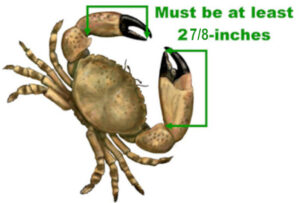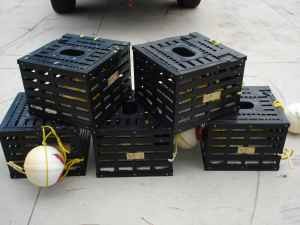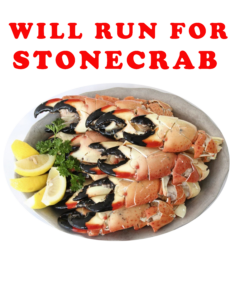The main Stone Crab harvest method used in both the commercial and recreational fisheries is a baited trap. Some recreational crab fishers collect crabs by hand (using scuba or snorkel gear). Most fishermen use traps. In the commercial stone crab fishery, traps are put out in long lines of up to 100 traps where each individual trap is buoyed. Recreational crab fishers are limited to five traps per person and a recreational saltwater fishing license is required by the harvester.
Stone Crab: Menippe mercenaria or Menippe adina
| Regulations | Gulf State Waters | Atlantic State Waters |
| Minimum Size Limit | 2 7/8-inch claw | |
| Daily Bag Limit | 1 gallon of claws per person or 2 gallons per vessel, whichever is less | |
*Harvest of egg-bearing crabs prohibited
Gear Requirements:
- Legal Gear: stone crab trap (max. 5 per person), dip or landing net
- Illegal Gear: Any device that can puncture, crush or injure the crab body, such as spears, grains, grabs, hooks or similar devices.
Trap Specifications
 Maximum trap size is 24 inches by 24 inches by 24 inches or a volume of 8 cubic feet
Maximum trap size is 24 inches by 24 inches by 24 inches or a volume of 8 cubic feet- Traps can be made from either wood, wire or plastic
- The throat or entrance must be 5 ½ inches by 3 ½ inches
- NEW: Throat must be 5 1/2 by 3 1/8 inches in Collier, Monroe and Miami-Dade
- If the throat or entrance is round, it cannot exceed 5 inches in diameter
- NEW: Round throats prohibited in Collier, Monroe and Miami-Dade counties
- The trap must have a degradable panel that is 5 ½ inches by 3 ½ inches and is made of cypress or untreated pine slat no thicker than ¾ of an inch
- Harvester name and address must be permanently affixed and legible
- The buoy must be no smaller than 6 inches and must be marked with a legible “R” that is at least 2 inches tall.
- Buoys are not required if trap is fished from a dock.
Trapping Regulations
- Traps must be pulled manually (not by a trap-puller). Any vessel that is rigged with a trap-puller will be considered a commercial vessel and the appropriate licenses will be required.
- Traps must be pulled only during daylight hours.
- Traps must not be placed in navigational channels of the Intracoastal waterways, or in navigational channels maintained and marked by any county, municipal, state or federal governmental agency.
State Waters Harvest Seasons:
Open Oct. 15 – May 1
Traps may be placed in the water 10 days prior to the opening of the season, but once placed, you may not tend to the traps until the start of the season, at which time you may begin harvesting.
Video: How to harvest a stone crab claw
Can both stone crab claws be harvested?
Yes. Both claws of a stone crab may be harvested lawfully if they are of legal size. Although it is currently lawful to harvest both of a stone crab’s claws, this practice leaves the stone crab with few alternatives to defend itself from predators.
Although the crab can still obtain minimal amounts of food with no claws, having one claw (if the other one is harvested) will enable the crab to obtain greater amounts of food in a shorter amount of time. Stone crabs (like other crustaceans) have the ability to grow back their claws, but this process requires a large amount of energy in the form of food.
The quicker the crab can obtain the energy required to molt and grow its lost claw, the sooner this renewable delicacy will have another claw to replace the missing one.
For more information:
- Find out how to measure stone crab claws.
Source: Recreational Stone Crabbing
These Keys Treasures Designs and many more are available on products such as T-Shirts, Stickers, Magnets, Mugs, Phone Cases, and much more at KeysTreasures.ReBubble.com




